Masakage
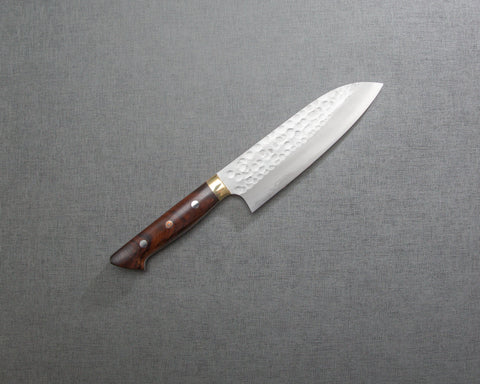
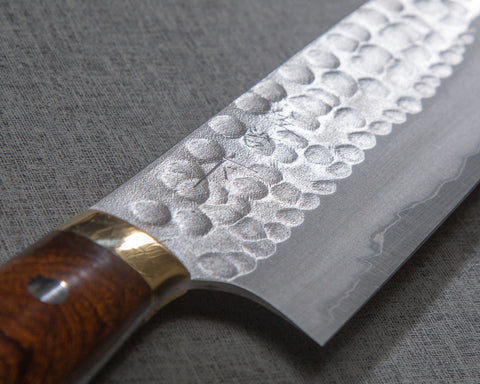
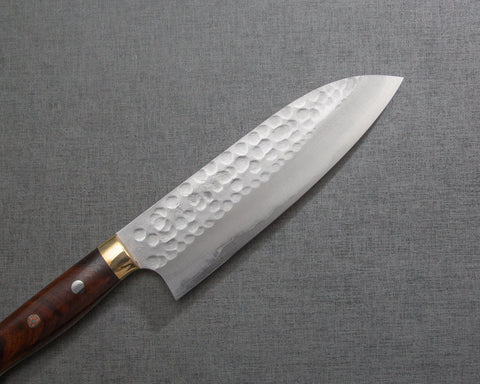
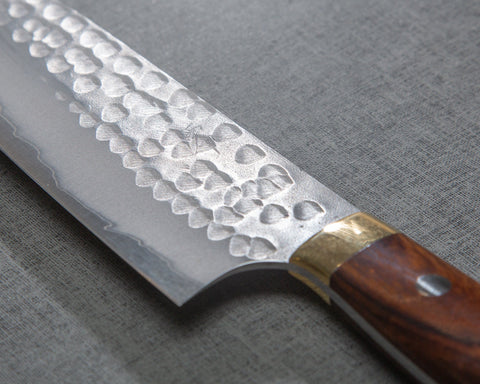
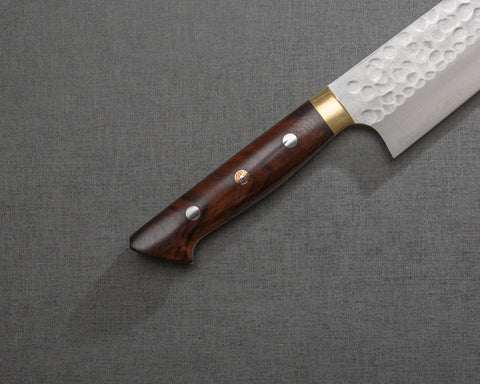
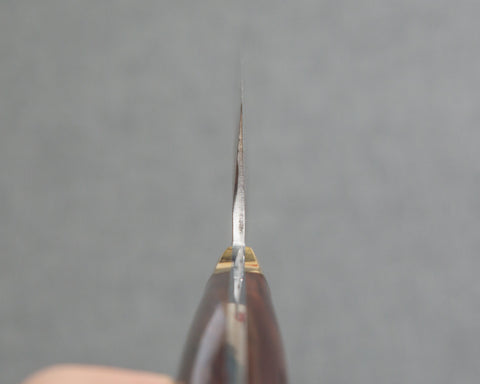
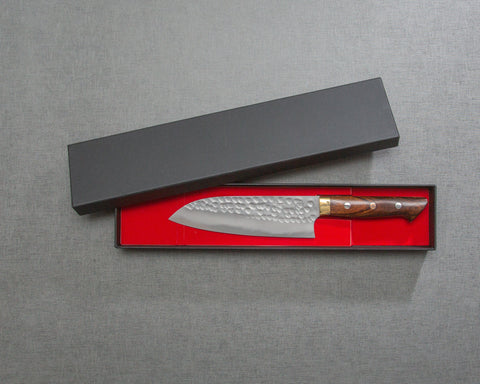
Masakage "Zero" Aogami Super Tsuchime 165mm Santoku
Pickup currently unavailable
This Masakage "Zero" Santoku is handcrafted by Takeshi Saji using Aogami Super steel, and hand-sharpened by Takayuki Shibata. The Tsuchime (hammered) finish isn't just visually pleasing, it also helps prevent food from sticking on the blade when cutting. The blade is paired with a western handle made of desert ironwood, with mosaic pins as decoration.
Spec:
- Origin (Made in): Fukuyama, Hiroshima Prefecture, Japan
- Brand: Masakage
- Craftsman: Takeshi Saji
- Sharpener: Takayuki Shibata
- Knife Type: Santoku
- Blade
- Construction: San Mai
- Grind: Double-edged Blade (50/50 Grind)
- Hagane (Core Steel): Aogami Super (Blue Super)
- Jigane (Cladding): Stainless Steel
- Hardness: 62-64 HRC
- Hand-forged, hand-ground, hand-sharpened
- Blade Finishes: Tsuchime (Hammered)
- Blade Length: 165mm (6.5")
- Blade Height (at heel):48mm
- Spine Thickness
- Above heel: 2.4mm
- Middle: 2.3mm
- Handle
- Shape: Western-shaped
- Material: Desert Ironwood
- Bolster: Stainless Steel
- Length: 123mm
- Overall Length: 297mm
- Weight: 205g (7.23oz)
- Engraved Mark: In Japanese Kanji "Masakage" (昌景)
About Masakage 昌景
Masakage Knives was founded in 2007 by Takayuki Shibata, one of the top knife sharpeners in Japan. His goal was to help the legendary artisans in Takefu Knife Village to showcase their talent as well as their handcrafted knives.
About Takeshi Saji 佐治 武士
Master Saji is the third generation blacksmith of Takefu City, Fukui Prefecture, who has been certified as a traditional knife craftsman at the age of 44. Now in his 70s, with over 30 years of experience in making handcrafted knives, Master Saji makes breathtakingly beautiful Damascus knives, which often paired with unique custom handles such as handcrafted iron wood handles. Having become a legend in hunting knife making, Master Saji has a unique eye for fine finish, and he's also innovating constantly by bringing new looks to knives.
Care:
Aogami Super (Blue Super) steel is considered the most superior Japanese high carbon steel for knife making. It is not stainless, therefore you must wipe your knife dry after each use, in particular the core steel not covered by the stainless cladding. Patina will develop over time, which will appear as “discoloration” on the cutting edge, but that is the nature of carbon steel - not a defect. The stainless cladding covers a large part of the blade, making maintenance easier but still preserving the cutting and sharpening pleasure of the Aogami Super core. Avoid cutting into bones, frozen foods, hard fruit pits.
Cutting Surface:
Recommended cutting surface: wood, rubberized boards and high-end composites, and quality plastics such as polyethene make acceptable cutting surfaces, and will help protect and prolong knife’s edge. AVOID glass, metal, countertops, and other rigid, non-forgiving surfaces.
Sharpening:
We recommend sharpening all quality Japanese knives on whetstones, as we believe they yield the best results for your knives.
I have other Saji knives which I love for the added heft compared with other forged artisan knives from Japan. I purchased this commune knife, probably at a better price point. The knife is all that you would expect although does have a small black carbon inclusion near the heal which I wasn't there. I am assuming at this point just a cosmetic blemish
Free Shipping
Free Shipping on most orders.
30 Days Return
Return unused within 30 days for a full refund, no questions asked (terms apply).
Top Japanese Makers
All knives made in Japan by top Japanese knife makers.
About
Burrfection Store sources professionally designed sharpening products, and knives from top Japanese craftsmen.
